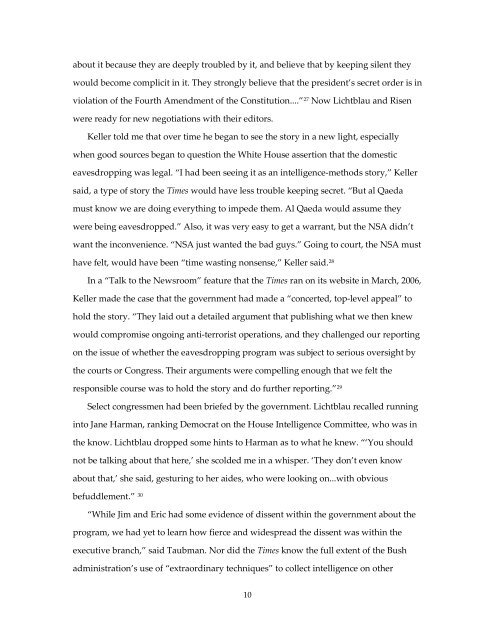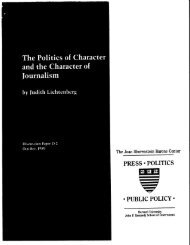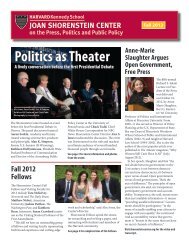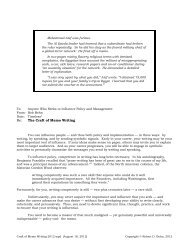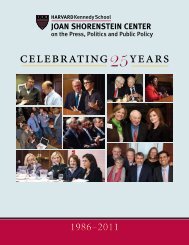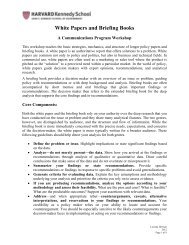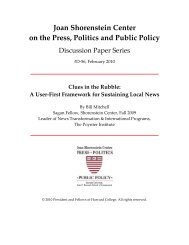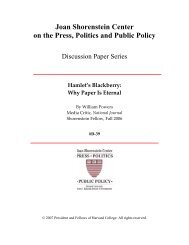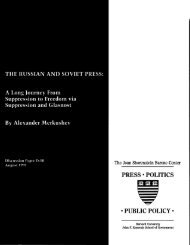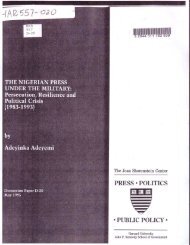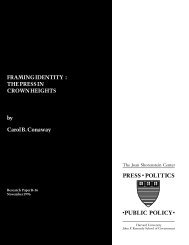Anatomy of a Secret - Harvard Kennedy School
Anatomy of a Secret - Harvard Kennedy School
Anatomy of a Secret - Harvard Kennedy School
You also want an ePaper? Increase the reach of your titles
YUMPU automatically turns print PDFs into web optimized ePapers that Google loves.
about it because they are deeply troubled by it, and believe that by keeping silent they<br />
would become complicit in it. They strongly believe that the president’s secret order is in<br />
violation <strong>of</strong> the Fourth Amendment <strong>of</strong> the Constitution....” 27 Now Lichtblau and Risen<br />
were ready for new negotiations with their editors.<br />
Keller told me that over time he began to see the story in a new light, especially<br />
when good sources began to question the White House assertion that the domestic<br />
eavesdropping was legal. “I had been seeing it as an intelligence-methods story,” Keller<br />
said, a type <strong>of</strong> story the Times would have less trouble keeping secret. “But al Qaeda<br />
must know we are doing everything to impede them. Al Qaeda would assume they<br />
were being eavesdropped.” Also, it was very easy to get a warrant, but the NSA didn’t<br />
want the inconvenience. “NSA just wanted the bad guys.” Going to court, the NSA must<br />
have felt, would have been “time wasting nonsense,” Keller said.<br />
In a “Talk to the Newsroom” feature that the Times ran on its website in March, 2006,<br />
Keller made the case that the government had made a “concerted, top-level appeal” to<br />
hold the story. “They laid out a detailed argument that publishing what we then knew<br />
would compromise ongoing anti-terrorist operations, and they challenged our reporting<br />
on the issue <strong>of</strong> whether the eavesdropping program was subject to serious oversight by<br />
the courts or Congress. Their arguments were compelling enough that we felt the<br />
responsible course was to hold the story and do further reporting.” 29<br />
Select congressmen had been briefed by the government. Lichtblau recalled running<br />
into Jane Harman, ranking Democrat on the House Intelligence Committee, who was in<br />
the know. Lichtblau dropped some hints to Harman as to what he knew. “‘You should<br />
not be talking about that here,’ she scolded me in a whisper. ‘They don’t even know<br />
about that,’ she said, gesturing to her aides, who were looking on...with obvious<br />
befuddlement.”<br />
30<br />
“While Jim and Eric had some evidence <strong>of</strong> dissent within the government about the<br />
program, we had yet to learn how fierce and widespread the dissent was within the<br />
executive branch,” said Taubman. Nor did the Times know the full extent <strong>of</strong> the Bush<br />
administration’s use <strong>of</strong> “extraordinary techniques” to collect intelligence on other<br />
10<br />
28


